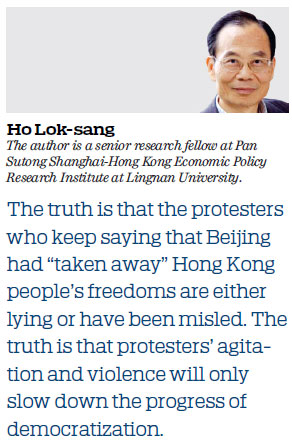Let’s make facts about promises straightforward
Updated: 2019-11-26 07:59
By Ho Lok-sang(HK Edition)
Many people in Hong Kong take it as a fact that Beijing failed to honor what had been promised. They allege that Beijing has effectively taken away Hong Kong people’s right to elect their chief executive, and that is the “institutional violence” that instigated their protests and then the violence.
But did Beijing ever promise Hong Kong people universal suffrage to elect the chief executive without requiring a nominating committee to first nominate candidates who will stand for election? The answer is an unequivocal “No”.
The Basic Law is the foundation of the establishment of the Hong Kong SAR and the “one country, two systems” principle. Violating the Basic Law is detrimental to “one country, two systems”. This is why we all have to adhere to the Basic Law.
Can the Basic Law be amended? Of course it can. But according to Article 159, the power to amend the Basic Law rests with the National People’s Congress. Amendment bills from the Hong Kong Special Administrative Region must first be submitted to the National People’s Congress, and the consent of two-thirds of the deputies of the region to the National People’s Congress, two-thirds of all the members of the Legislative Council of the region, and that of the chief executive of the SAR must all be obtained first. Moreover, the Committee for the Basic Law of the Hong Kong SAR would need to study the proposed amendments and offer its views.

The Basic Law is the result of many years of consultation. A Basic Law Consultative Committee consisting of Hong Kong community leaders, formed in 1985, helped collect views on the draft. The final version of the Basic Law was promulgated in 1990, and took effect on July 1, 1997. While the Basic Law protects Hong Kong people’s basic rights such as a free press, freedom of speech, freedom of religion, freedom of assembly and the right to a peaceful demonstration, etc., it also protects Beijing’s interests in territorial integrity and development.
How does the Basic Law protect Beijing’s key interests? This is through some key provisions. Without those key provisions, Beijing would never have allowed Hong Kong to have universal suffrage to elect its chief executive. As to universal suffrage to elect Legislative Council members, Article 68 provides that “The method for forming the Legislative Council shall be specified in the light of the actual situation in the Hong Kong SAR and in accordance with the principle of gradual and orderly progress. The ultimate aim is the election of all the members of LegCo by universal suffrage.”
At the Ninth Session of the Standing Committee of the 10th National People’s Congress in 2004, it was noted that with the number of members of the LegCo returned by geographical constituencies through direct elections substantially increased, “the impact on the operation of the Hong Kong society as a whole, especially the impact on the executive-led system, remains to be examined through practice.” This shows that the NPC is quite cautious and that further progress toward universal suffrage to elect all legislators must be based on the successful operation of the political system that does not jeopardize “one country, two systems”.
How about election of the chief executive? We should all take a good look at Article 45, which states: “The method for selecting the chief executive shall be specified in the light of the actual situation in the Hong Kong Special Administrative Region and in accordance with the principle of gradual and orderly progress. The ultimate aim is the selection of the chief executive by universal suffrage upon nomination by a broadly representative nominating committee in accordance with democratic procedures.”
Readers should note that Beijing has promised that ultimately, there will still be a nominating committee to first nominate candidates before the candidates face the vote. People may complain that our nominating committee is not broadly representative enough. But a broadly representative nominating committee will have to wait under the principle of gradual and orderly progress. While we are not there yet, in time we will, provided that the actual situation permits.
Unfortunately, given the illegal “Occupy Central” movement and the recent riots, how can we expect Beijing to agree to the ultimate ideal promised under the principle of gradual and orderly progress? Can anyone find evidence that Beijing had promised Hong Kong universal suffrage that dispenses with the need for a nominating committee?
So the truth is that the protesters who keep saying that Beijing had “taken away” Hong Kong people’s freedoms are either lying or have been misled. The truth is that protesters’ agitation and violence will only slow down the progress of democratization. The truth is that in 2015 the Hong Kong SAR government had already offered universal suffrage that is considered liberal given the circumstances, even though it still stays within the requirements of the Aug 31, 2014, NPCSC decision.
The sad thing is that our professional legal bodies, namely the Law Society of Hong Kong and the Hong Kong Bar Association, instead of helping to dispel the delusion of the protesters, actually fueled the fantasy. I hope they will do Hong Kong a service, and start telling the truth.
The views do not necessarily reflect those of China Daily.
(HK Edition 11/26/2019 page9)
